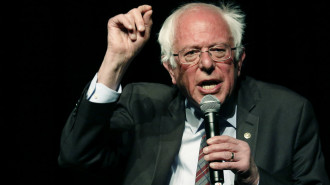Israeli forces killed 165 Palestinian children in West Bank over past year: UN
Israeli forces have killed at least 165 children in the West Bank over the past year, the UN has said.
Of those killed, at least 129 were killed by Israeli live ammunition "mostly in the upper body and head", the Office of the High Commissioner for Human Rights (OHCHR) said, while 36 were killed by air strikes.
The latest child to be killed was 11-year-old Abdullah Jamal Hawash, who was shot during a raid in Nablus on Tuesday.
The young boy sustained wounds from the Israeli gunfire, before eventually succumbing to his injuries later that day.
OHCHR said the boy did not pose any "realistic threat" to Israeli forces, after videos shared online showed Hawash throwing stones at them during the violent raid.
On 13 October, a 17-year-old boy identified as Osama Mahmoud Hasan Adawi, was also shot and killed by Israeli forces amid a raid in the West Bank, this time in Hebron.
In a report published in July this year, UN children's agency UNICEF said that a Palestinian child in the West Bank and east Jerusalem "is killed every every two days" since Israel began its military campaign in Gaza on 7 October last year.
UNICEF said the current statistic was a 250 percent increase compared to the previous nine months – which was also a significantly deadly period in the occupied Palestinian territory.
Israeli forces have dramatically intensified their violent raids on the West Bank – occupied since 1967 – following the start of Israel’s military offensive in the besieged enclave.
The military has carried out large-scale raids across several refugee camps around the areas of Tulkarem, Nablus, Ramallah, Jenin and other locations.
Deadly, almost-daily incursions were already frequent in the West Bank prior to 7 October 2023.
At least 760 Palestinians have been killed in the West Bank, including women, children and the elderly. A further 6,250 have been injured by Israeli forces.
Over 11,400 Palestinians, including journalists, have been arrested during the same period, the Palestinian Prisoners’ Society, said.
![Palestinian children mourn loved one in West Bank [Getty]](/sites/default/files/styles/large_16_9/public/2118356788.jpeg?h=a5f2f23a&itok=JqPfYSey)



 Follow the Middle East's top stories in English at The New Arab on Google News
Follow the Middle East's top stories in English at The New Arab on Google News
![The US vetoed a UN Security Council (UNSC) resolution demanding a ceasefire in Gaza [Getty]](/sites/default/files/styles/image_330x185/public/2185152251.jpeg?h=7ef8ac04&itok=RpLSj2pu)

![An attack by paramilitary forces in Sudan has killed at least 40 people [Getty]](/sites/default/files/styles/image_330x185/public/2182364341.jpeg?h=a5f2f23a&itok=r8Fkhxdj)